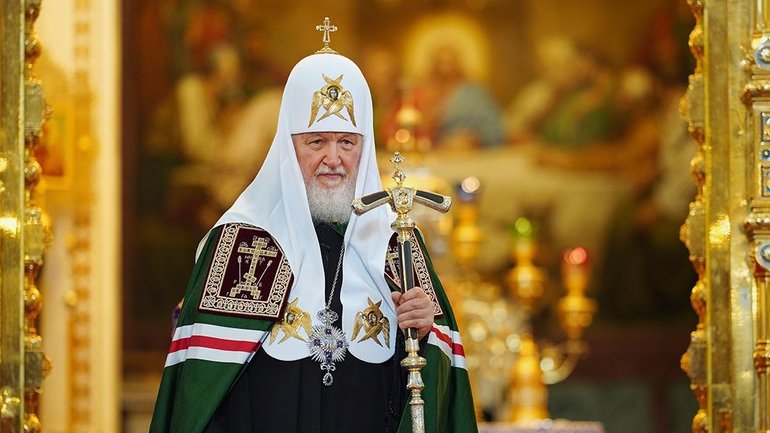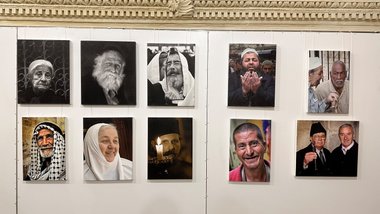"Holy War" of Kirill (Gundyaev), Patriarch of the "Russian World"

Kirill's speech at the XXV Congress of the World Russian People's Assembly stirred up the whole world. But he didn't say anything new there. After all, 24 such "assemblies" had been held previously. In the last one, the Patriarch simply summed up everything previously said, and the only new thing he added was labeling the SMO (Special Military Operation) as a "holy war."
In his view, the SMO is not Russia's war against Ukraine but a struggle of "Holy Rus" against the eternal enemy of Orthodoxy – the "collective West." He never spoke about a war against Ukraine before either; he always emphasized that Russia is fighting against the "civilization of evil" on its own land. In the minds of Russians, in the socio-political and ecclesiastical thought of Russia, Ukraine is not a separate state but a part of Holy Rus occupied by the West – the baptismal font of the Russian people. The borders of Russia are sacred because they are the borders of the Church. The war is sacred because it is waged by the Russian Church, which is the guardian of the traditional values of the "civilization of the Russian World".
To effectively instill the "Russian World" propaganda in the minds of Ukrainians, Patriarch Kirill transformed the Russian Orthodox Church (ROC), of which the Ukrainian Orthodox Church (UOC) is an integral part, into a bloated bureaucratic, well-controlled system, appointing refined functionaries to key positions. The Russian and Ukrainian church-political elite, using the traditions of the elders, various legends and legends, often distorting the Scriptures and patristic tradition, for decades created meaningless, pagan, "Orthodox" myths, ideologemes and mythologemes. This murkiness lived in the church consciousness for a long time and, in the war against Ukraine, revealed its true face and revived with renewed strength.
The patriarch's speeches are not sermons but ordinary propaganda of Putin's personal political interests. But if in Nazi Germany, for example, Goebbels was engaged in national stylization and popularization of imperial politics, in modern Russia, this is being done by the Orthodox Patriarch.
The patriarch is not a philosopher who creates a system of thought. He is an ideologue who construes a myth so that people believe in the authorities and follow their orders as the will of God because "righteous authority ... follows true values and guides the individual and society towards God." The Patriarch speaks like an experienced politician, so it is impossible for an ordinary person to immediately understand when he is a church pastor and when he is a secret official of the state apparatus. Let's try to separate these two hypostases.
An art of church preaching is called homiletics.
The sermon is essentially an interpretation of the Gospel stories, and therefore, the sermon is Christ-centered. Its construction is very simple: the beginning is taken from the Gospel passage proposed by the Church for this day, then an example of the life of saints or ordinary people according to Christ is given, and practical conclusions are drawn at the end. But Patriarch Kirill's speeches are based on a different principle, although they also lead to practical results.
There is a field of study called rhetoric, in which politicians and psychologists learn to effectively influence people, and modern PR technologies allow for achieving maximum effectiveness in influencing the human psyche. The speeches of the current patriarch do not adhere to the laws of homiletics and do not fall under the definition of preaching. This is the propaganda of the Russian World concept, based on the traditions of totalitarian rhetoric, featuring a large number of slogans that are easily remembered and stay in the mind for a long time, becoming a familiar and even natural part of language.
In a certain sequence, historically and causally, a chain of ideologemes is being constructed, for example, "the dominant aspect of sanctity," "the civilizational choice of Prince Volodymyr," "the values of the Russian World," which need to be protected from the "secular world," which is "Western," and "attempts have already been made by the West to destroy it." But we are "Holy Rus"; we will stand up and "defend Orthodoxy" because where Russians, that is, Orthodox, are disliked or oppressed, the Russian shrine is oppressed. And how can a Russian Orthodox person sit quietly at home if the developments in Ukraine comprise "discrimination on religious and national grounds"?
In every sermon and every speech, special emphasis is placed on these simulacrum slogans, not on the image of Christ, but on the necessary conclusions already made by the speaker instead of the audience, and a powerful emotional onslaught is made. Any ideology conveyed through language becomes integrated into a person's inner world. Once heard, it cannot be easily ignored or forgotten. Firewood has already been put in the stove, the main thing now is to light and maintain a fire in the furnace.
The patriarch rarely and fleetingly speaks about Christ. His ideology uses the religious lexicon, historical experience and values that already exist in society to create a new reality. Therefore, his doctrine is modern in its way of construction and presentation: "Today, our country is on the threshold of a new historical choice, a new stage of development. At this moment, we must consider how not to copy something using old templates but achieve a new ideological synthesis by rising to the level of genuine social creativity."
The patriarch skillfully uses the stylistic technique of opposition, playing on contrasts. Here is what he said immediately after Russian troops entered Ukraine in 2014: "Currently, tragic reports emerge indicating that sometimes when interrogating people, individuals from the opposing camp, who do not accept the concept of the Russian World, tempt individuals by asking if they are supporters of the Russian World. And if they courageously reply positively, they are destroyed. Well, if the strength is not enough to say "yes", the person is silent or says something that is pleasant for the martyrs to hear. In any ideology, they elevate some and humiliate others, and thus maintain a combat "spiritual" tone. "This concept alone – the Russian World – infuriates our opponents," says Patriarch Kirill.
With such methods at its disposal, the Soviet Union cultivated hatred towards the world around it, thus internally and mentally welding people into a faceless monolith.
After all, people in Russia mostly watch TV with reverence, as they listened to the priest from time immemorial. And now, a person neither expects nor is psychologically ready to hear political speeches from the pulpit; their consciousness is maximally uncritical, as holy words are spoken in a sacred place.
Instead of Christ in the church, believers are offered "Slavic values" at sermons, and valuables, as you know, can be easily sold. Such things simply unsettle people's minds, like an alarm clock set to ring at a specific time. And a person remembers not so much words as the internal logic of an ideological message. She listens without thinking because it is impossible to think here. And without hesitation, without doubting themselves, they act because the speaker in his cassock ignites base passions with his words.
Mythologizing a person's consciousness always leads to blind, fanatical belief. Hyperbolizing their faith in themselves and their abilities, people find faith in those who embody this primitive worldview in practice: "civilization of good is Russia" and "civilization of evil is the rest of the non-Russian world." So, what is your moral "civilizational choice"? It is clear what it is!
After listening to the fiery speeches of the preacher in one breath, a sorrowful feeling of involvement with the Church arises in the soul, along with a sense of belonging to the "great power." All complex moral issues seem so simplified that they can be distilled into a simple formula: listen, be silent, act. Ideology is incapable of opening up qualitatively new depths of the world a person perceives; instead, it narrows the worldview within the confines of mythological constructs and provides assessment: "The Russian world is the spiritual, cultural, and value dimension of human personality" (Patriarch Kirill).
There is not a single high paradigm in the pragmatic philosophy of the patriarch's life, it is not the opinion of the theologian that works on it, but the Institute of PR managers. The doctrine of the Russian World is a political innovation. The patriarch's speeches are a modern synthesis of historical contradictions: "Ancient Rus, Holy Rus – the dominant aspect of sanctity and the heights of the human spirit." We have designated this value with the word "faith". The Russian Empire turned a small country into a colossal world empire from Ocean to ocean. And we found the word that covers this reality – the statehood. Then comes the revolution. We responded that people had a longing for justice. If this longing did not exist, then no propaganda would have worked. And in Soviet times? ... Can we safely accept and integrate anything in our own philosophy of life? It was solidarity" (Patriarch Kirill). "Faith," "statehood," "justice," "solidarity"... Christ is not mentioned in this fundamental speech, neither verbally nor in essence. The word is the carrier of the spirit that lives in those who utter it. I do not know if the Holy Spirit can live in words that fear Christ.
Whenever the Patriarch spoke, be it the Twelve Great Feasts, Easter, or Christmas, you will hear the same slogans and draw the same conclusions. People eventually get used to unusual words in the church and later consider them normal preaching and later a common, natural phenomenon in life. Eventually, it becomes true after a powerful apology of ideology with quotes from the Holy Scriptures.
If Hitler's propaganda of German Nazism flared up for one decade, then the Russian one – starting in 1996 – has been dispersing Russians' hatred of other peoples under the slogans of "holy war" for the third decade. One can only imagine how much more is accumulated in the Russian people and what consequences this can lead to if the world does not stop Russia.
I really don't want future generations to identify the deep and ancient Orthodox tradition with the Russian World. So, let's try to separate the wheat from the chaff – true Christianity from the Russian social religion – the Russian World. Unfortunately, because of the war that Russia is waging against Ukraine under the slogans of the Russian World, it has affected all segments of Ukrainian society. Who else, if not theologians and who else, if not the Orthodox Church of Ukraine, should be the first to give a worthy rebuff to the propaganda of the Russian World, because of which Ukrainians have been dying for the tenth year in a row? I believe that the OCU should raise the issue of condemning the doctrine of the Russian World at the world level. I think that the reaction of world Orthodoxy to Kirill's church propaganda is somewhat sluggish and belated. Despite this, all concerned laity and clergy need to expose the evil that the propaganda of the Russian World brings to humanity on all platforms. After all, Patriarch Kirill has repeatedly stressed that the Russian World has no borders – the Russian World is where the Russians are.
##DONATE_TEXT_BLOCK##










